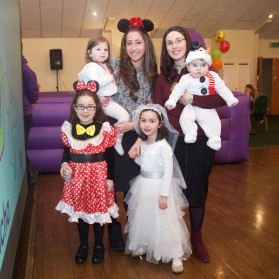


Having a seriously ill child takes a big toll on a family and the siblings can often be the forgotten sufferers.
Manchester-based Rifka Stern’s three daughters were all aged under six when their baby brother Ari was born with a serious heart condition.
“Apart from all the worry around Ari – the hospital stays, doctors’ appointments, operations – our other big fear was that the girls would see Ari’s birth as something negative. That was our main reason for turning to Camp Simcha,” says Mrs Stern, from Prestwich.
“That is exactly what Camp Simcha has helped us with. Infact, the other day my oldest daughter Zahava told me that while she prays for Ari to get better, she hopes we don’t have to stop having Camp Simcha.
“The girls see it that their family is special and that they are privileged to be part of Camp Simcha.”
Camp Simcha supports the whole family when a child is diagnosed with a serious illness, not just the ill child but also the parents and the siblings also.
As well as being invited to all the parties and outings which Camp Simcha lays on, siblings can have their own dedicated volunteer ‘Big Sister’ or ‘Brother’ and may attend Sibling Art and social groups. Services such as counselling, therapeutic art sessions, Pet Assisted Therapy and tutoring are also available if a sibling needs it.
Camp Simcha Head of Services Daniel Gillis explains: “Different families have different needs for the siblings. The younger sibling of a previously well child who then gets diagnosed with a serious illness may experience different emotions to one who is born into a family that already has a child with a long-term serious illness.
“In addition, the long-term prognosis for the ill child will have a huge impact on the trauma for the sibling and the support which is needed. Our Family Liaison Officers are there to facilitate the right support for each family’s needs.
Mrs Stern says: “Zahava, who is nine, and my other two daughters, Penina, eight, and Aviva, who is six, have their own volunteer ‘Big Sister’ who visits them every week and has been with us since we started with Camp Simcha.
“They go to a Sibling Art group, which they absolutely love. It’s good for them to be with other children who are going through a similar thing. The art teacher, Chava, has got to know the girls and she seems to know what to say to them.
“For the most part we are used to our new way of life and the girls are very good with it, but they are always on high alert. If ever I am late for school pick-up or someone else collects, Zahava in particular automatically assumes I am in hospital with Ari.
“Having their Camp Simcha Big Sister Sara really helps. She comes in every Tuesday and gives them lots of attention. If Ari has a hospital appointment on another day, she will come then instead, collect them from school and take them out. It really takes the pressure off me and the girls adore being with her. It also means they don’t all feel like they are being dispatched in different directions.”
The family also attends the Camp Simcha outings and the charity’s annual retreat – three days with other families enjoying fun activities; with relaxation and respite for the parents, as well as professional guidance and time together in a beautiful hotel environment, with all their medical needs catered for.
“It’s just such an incredible few days for all of us – and my girls love spending time with the other children. They have made friends from it; some are not even their age, but they just get together and chat with people who understand.”
Presently Ari, who is now three, is doing well, says Rifka, and will hopefully start school in September. “He is on the waiting list for another procedure, so we are in a limbo a bit at the moment. But it really helps knowing Camp Simcha is there if we have to drop everything.”
Camp Simcha art therapist Natasha Ainley often sees siblings to help them work through the feelings they may be managing.
“In my experience, siblings of seriously ill children experience many different emotions. There is often anxiety, the feeling of not understanding what is happening or what is going to happen long-term with their brother or sister, but also on a day-to-day basis the child may not know whether their parents will be at home and there for them.
“Lack of attention is a common feeling and there is often a lot of anger, as well as guilt that they feel that way. These emotions build up; the child might want to do something which calms them or they may need to scribble or tear something to let those feelings out in a safe environment, where there are boundaries but space to be able to work on their issues.
“I bring a wide range of art materials: clay, drawing materials, games… it’s their choice, and we have conversation during the process. Art therapy provides them with a safe environment and gives them 1:1 attention with the therapist to be able to understand and make sense of what is going on in their unconscious world.”
Daniel adds: “When a sibling is struggling, having the extra one-to-one attention from someone like Natasha or from a Camp Simcha volunteer visiting them each week – or even just the peer support that the sibling groups and outings bring, gives them something to look forward to, something they know they have regularly. That can make all the difference to how they cope.”